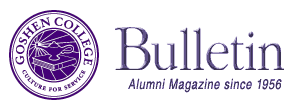
About this issue:
The art - and bachelor of science degree - of nursing
Goshen College’s Department of Nursing is distinguished
as the first baccalaureate nursing program in the State of Indiana,
now celebrating 50 years and more than 1,600 graduates. Today,
around 600 college and universities offer a bachelor’s degree
and post-graduate programs in nursing.
Innovative in its initiation, nursing education at Goshen College
five decades since its inception is creative still. Goshen graduates
are prepared to provide culturally sensitive care and leadership,
to promote critical thinking and good communication as they learn
about patients, consult with colleagues, understand treatment
options and technologies and, very often, balance a high patient
load.
Nursing is an active, humanistic art – some professionals,
educators and theorists have embraced the term “dance”
to describe it – and nursing educators must provide students
with a complex set of skills to master it. In a baccalaureate
program, this can happen. At Goshen, it happens exceptionally
well, according to the department’s recent 10-year accreditation
report of the nursing program by Commission on Collegiate Nursing
Education (read more in this issue).
The impact of Goshen’s 1,627 nursing graduates is beyond
calculation. Consider the number of patients who have come into
the care of each nurse – in an ever-increasing number of
specialized areas and diverse settings from the office of a family
physician to a community health fair, from a hospital cardiac
unit to an elementary school, from an urban research project to
a rural birthing center, from a U.S. state health department to
a nursing college in India. Then consider those patients’
families, churches, neighbors, communities and countries: the
potential influence is enormous for empowerment for self-care,
sharing of information and making a positive impact on regional
populations.
With an increasingly culturally diverse population, an aging baby
boomer generation and highly technology-driven health services,
the United States needs nurses schooled in the art and science
of their profession more than ever. We need them to practice their
“humanistic art’ – a practice that is holistic
and attends to the person as well as his/her response to disease.
According to American Hospital Association’s “TrendWatch,”
more than 100,000 nurses are needed to fill vacancies at our nation’s
hospitals. Today, fully 75 percent of all hospital vacancies are
for nurses. A study by Dr. Peter Buerhaus and colleagues published
in the Journal of the American Medical Association three years
ago revealed that the U.S. will experience a 20 percent shortage
in the number of nurses needed in our nation’s health care
system by the year 2020.
At the same time, nursing education programs across the country,
including Goshen’s, have experienced a decline in recent
years. Significant efforts have been underway to reverse that
trend, partnering colleges and universities with medical facilities
and even governmental agencies and businesses that have a vested
interest in meeting the nation’s healthcare needs. We can
help, too, by encouraging both traditional-age college-bound students
and adults among us interested in a career change or in furthering
nursing training who have relevant gifts to consider a B.S.N.
Celebrate 50 years of excellence in the art of nursing by understanding
its importance to the future of us all.

 About this issue:
About this issue: 

